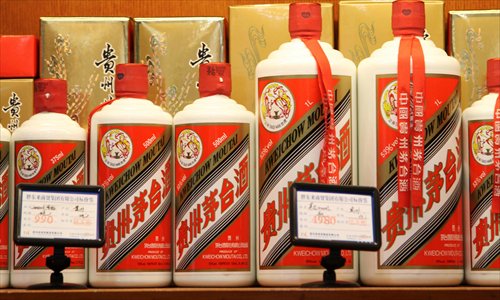Last call

The iconic liquor served at the nation's official banquets, Moutai, has taken a blow as its retail prices reached a new low amid campaigns to tighten restrictions on government consumption of high-end commodities.
The drastic price drop coincided with weakened market demand for luxury items following an announced plan to publicize civil servants' personal assets, in what analysts say is a display of official determination to boost transparency and enhance government credibility.
A bottle of 53-degree Feitian Moutai is priced at 1,519 yuan ($238) by the Guizhou-based brewer but was sold for as high as 2,700 yuan in December last year in some major cities, due to robust demand and relatively low availability in the market. The product, however, could be bought at 1,300 yuan for bulk purchase in Beijing last month.
"Moutai has previously been a must-serve liquor at official receptions for higher level visiting officials but it's been removed from the table during the past few months," said a government employee surnamed Ma, who is in charge of official receptions at a government agency.
Ma said his organization purchases more than 100 bottles of Moutai each year for official banquets at a price of 600 to 700 yuan per bottle from designated suppliers.
Different liquors are served at receptions depending on the level of the visiting officials, he said, ranging from Moutai to cheaper local brews that are priced as low as 200 yuan per bottle.
A regulation passed by the State Council on June 13 that will take effect on October 1 stipulates that government departments are not allowed to purchase luxury goods or services that exceed the outlined standards.
The regulation, aimed at cutting government operational costs and deterring corruption, outlined restrictions regarding the "three public expenses," which refer to spending on official receptions, vehicles and overseas travel.
Officials who breach the regulation could face penalties or even be dismissed from office.
Analysts say the restrictions on government spending have had a significant impact on the high-end commodity market in China, with most of the costly liquors used in official receptions and other commodities often being purchased as gifts for officials.
"Serving Moutai seemed to be a tradition in official and commercial receptions, as its high price indicates social status," said Yang Qingshan, an expert on liquor and wine. Government agencies and the military are the major consumers of Moutai, he said.
The company said in an online statement that it has designated a total of 19,800 tons of varying types of Moutai liquors for distribution by other retailers throughout the country this year, which does not include Moutai's own sales networks.
Figures indicate that sales to the general public via retail outlets only account for a tiny fraction of Moutai's annual sales.
A Moutai wholesaler in Beijing told the Global Times that the price has been decreasing, and currently they sell a bottle of 53-degree Feitian Moutai for 1,480 yuan, a few hundred yuan cheaper than a few months ago.
The restrictions on the three public expenses have led to declining market demand, not only for high-end liquors but also for many other luxury commodities such as cars and clothing, Yang noted.
An Economic Observer report in June said that purchasing data showed a declining trend in luxury goods consumption on the Chinese mainland during the first quarter of this year.
Many luxury brands reported sales decreases or slower increases in the Chinese market compared to the same period last year.
Although government spending restrictions have resulted in declining market demand to some extent, experts say the overall economic situation, which is undergoing a slowdown, could be another reason for the decreasing appetite for luxury goods in China.
"People or companies who buy pricey goods as gifts to please officials or for business needs account for 40 percent of the overall luxury commodity consumers. High-end liquor and tobacco will be the most affected commodities, while luxury gifts might not be as seriously affected," said Zhao Zhongxiu, vice president of the University of International Business and Economics, who is also a consultant with the university's luxury goods research center.
He added that currently it is an "off-season" for both the purchase of Moutai and luxury gifts, and these commodities might see a slight increase in prices in September and October, when official visits become more frequent and people are busy procuring gifts.
"Overall, luxury goods consumption may not be affected by the restrictions in the long run," he said, "as detailed procurement records of Moutai and other luxuries are less likely to be publicized."
Zhang Yubiao, a National People's Congress deputy, said early this year that official receptions should avoid serving liquor or tobacco that costs more than 500 yuan, and expensive or rare food such as shark fins and bird's nests should also be banned from the table, the Beijing News reported.
A regulation released by the city government in Wenzhou, Zhejiang Province, in July stipulated in detail that expensive foods, liquors and cigarettes were to be banned from official receptions. It added that government employees were entitled to a 60 yuan budget for each meal or reception, which could not be held in a star-rated hotel.
However, a detailed national regulation regarding government public spending has yet to be established. More than 90 central government agencies disclosed their "three public expenses" budgets in 2011 on July 19 by releasing data online, in a move that was hailed by many although some still claimed that the level of disclosure was insufficient.
"There's still a lot of government spending that is not included in their budget, which has been kept from public supervision," said Zhu Lijia, director of Public Administration Studies at the Chinese Academy of Governance.
A more detailed national regulation is urgently needed, he said, which should specify requirements such as the cost per person for official receptions.